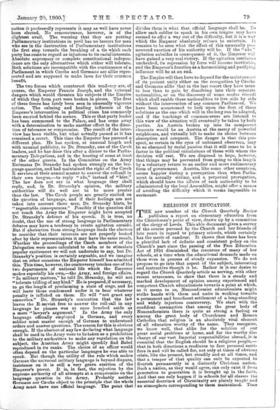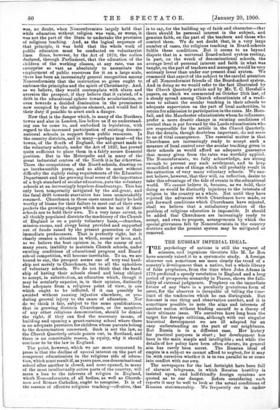RELIGION IN EDUCATION. T HE new number of the Church Quarterly
Review publishes a report on elementary education from. the Churchman's point of view, drawn up by a committee of the clergy of Leeds. This able document gives a survey of the course pursued by the Church and her friends of late years in regard to primary schools, which certainly has the merit of candour. It shows that there has been a plentiful lack of definite and consistent policy on the Church's part since the passing of the Free Education Act of 1891 diminished the resources of many of her schools, at a time when the educational demands made on them were in process of steady expansion. We do not propose to go into that aspect of the subject, interesting and instructive though it be. Rather is it our desire to regard the Church Quarterly article as serving, with other recent utterances, to show that there is a steady and marked development of opinion among experienced and competent Church educa.tionists towards a point at which, as it seems to us, Nonconformist educationists might strike hands with them and unite in working towards a permanent and beneficent settlement of a long-standing and widely injurious controversy. We start with the confident assumption that among the great body of Nonconformists there is quite as strong a feeling as among the great body of Churchmen and Roman Catholics that religion is an absolutely vital element of all education worthy of the name. They recognise. we know well, that alike for the solution of our great social problems at home, and for the worthy dis- charge of our vast Imperial responsibilities abroad, it is essential that. the English should be a religious people,— that in both directions a readiness to face personal sacri- fices is and will be called for, not only at times of obvious crisis, like the present, but steadily and at all times, and that a temper of that quality can only be expected to flourish permanently in a distinctly Christian nation. Such a nation, as they would agree, can only exist if from generation to generation it is brought up in the faith. And that can only happen if in schools for all classes the essential doctrines of Christianity are plainly taught and an atmosphere corresponding to them maintained. Tiwe was, no doubt, when Nonconformists largely held that while education without religion was vain, or worse, it was not the part of the State to undertake the provision of religious teaching. And, as the logical sequence of that principle, it was held that the whole work of public education must be conducted on voluntaryist lines. Since, however, by the Act of 1870, the nation declared, through Parliament, that the education of the children of the working classes, at any rate, was an enterprise so vast as absolutely to necessitate the employment of public resources for it on a large scale, there has been an increasingly general recognition among Nonconformists that the instruction so given ought to embrace the principles and the spirit of Christianity. And, as we believe, they would contemplate with alarm and aversion the prospect, if they believe that it existed, of a drift in the educational sphere towards secularisation, or even towards a decided diminution in the prominence now occupied by the religious element, and would feel it their duty if possible to avert such a danger.
Now that is the danger which, in many of the Northern towns and also in London, lies before us if no understand- ing can be come to, and embodied in legislation, with regard to the increased participation of existing denomi- national schools in support from public resources. In the country districts, and in many—perhaps most—of the towns, of the South of England, the aid-grant made to the voluntary schools, under the Act of 1897, has proved quite sufficient to place them in a fairly secure financial position. But in the Metropolis and in many of the great industrial centres of the North it is far otherwise. There the competition of the Board-schools, drawing on an inexhaustible purse, and so able to meet without difficulty the rightly rising requirements of the Education Department and the growing local sense of the importance of a high standard of secular education, puts the voluntary schools at an increasingly hopeless disadvantage. This has only been temporarily mitigated by the aid-grant, and the fatal drift towards starvation has been unmistakably resumed. Churchmen in these cases cannot fairly be held worthy of blame for their failure to meet out of their own pockets the growing charges which must be met if their schools are to hold their own. To a very large extent, in all thickly populated districts the machinery of the Church of England is on a purely voluntary basis,—churches, mission-rooms, and clergy being provided and supported out of funds raised by the present generation or their immediate predecessors. That is perfectly right, but it clearly creates a situation in which, sooner or later, and, as we believe the best opinion is, in the course of not many years, inability to maintain Church schools, uuder existing conditions of educational progress and Board- school competition, will become inevitable. To us, we are bound to say, the prospect seems one of very real hard- ship not merely to Churchmen, but to all the upholders of voluntary schools. We do not think that the hard- ship of having their schools closed and being obliged to accept, in substitution, an education which, though it may be secularly superior, is, in their opinion, distinctly less adequate from a religious point of view, is one which ought to be inflicted, if it can possibly be avoided without causing injustice elsewhere, or pro- duoing general injury to the cause of education. Nor do we think it fair, subject to the same qualifications, that in growing districts Churchmen, or the members of any other religious denomination, should be denied the right, if they can find the necessary means, of building and opening a grant-earning school where there is no adequate provision for children whose parents belong to the denomination concerned. Such is not the law, as the Church Quarterly article points out, in Scotland, and there is no conceivable reason, in equity, why it should contiuue to be the law in England.
The point, however, which we are more concerned to press is that the decline of special interest on the part of competent educationists in the religious side of educa- tion, which must result if, as years pass, one denominational school after another is closed, and none opened, in many of the most intellectually active parts of the country, will mean a loss to the interests of religion in England, which Nonconformists, of all bodies, as well as Church- men and Roman Catholics, ought to recognise. It is of the essence of effective religious teaching—effective, that is to say, for the building up of faith and character—that there should be personal interest in the subject, and genuine faith, on the part of the teachers and those who control them. We do not doubt that, in a very large number of cases, the religious teaching in Board-schools fulfils these conditions. But it seems to us beyond dispute that in a universal Board-school system resting, in part, on the wreck of denominational schools, the average level of personal interest and faith in what was taught, on the part of teachers and managers, would be very seriously lower than under our present dual system. We commend that aspect of the subject to the careful attention of all Nonconformist friends of the Board-school system, And in doing so we would refer to the fact illustrated by the Church Quarterly article and by Mr. T. C. Horsfall's papers, on which we commented on October 28th last, of a steady spread among Church educationists of a readi- ness to submit the secular teaching in their schools to adequate supervision on the part of local authorities, in return for admission to participation in the rates. Mr. Hors- fall, and the Manchester educationists whom he influences, prefer a. more drastic change in existing conditions of control than is put forward by the Leeds educationists who are responsible for the article in the Church Quarterly. But the details, though doubtless important, do not seem to us of vital consequence. The essential matter is that Churchmen are increasingly ready to accept such a measure of local control over the secular teaching given in their schools as would afford an adequate guarantee that money given from the rates was worthily applied. The Nonconformists, we fully acknowledge, are strong enough to prevent any such settlement, and to keep unmodified a state of things which will probably result in the extinction of very many voluntary schools. We can- not believe, however, that they will, on reflection, desire to take this advantage of the tide of events in the educational world. We cannot believe it, because, as we hold, their doing so would be distinctly injurious to the interests of religion in the country as a whole. Not until they have rejected the advances which Churchmen have made, or put forward conditions which Churchmen have rejected, shall we believe that a satisfactory solution of the problem of religious education is impossible. It should be added that Churchmen are increasingly ready to accept, and even to propose, arrangements by which the special grievances felt by Nonconformists in the country districts under the present system may be mitigated or removed.







































 Previous page
Previous page